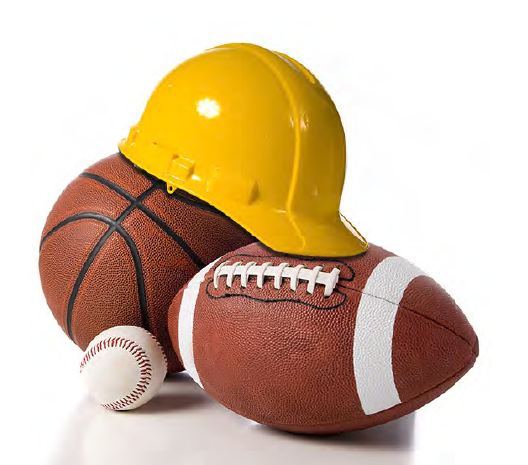
Construction companies share a lot in common with sports teams in this regard. When things go wrong, it’s usually not for lack of good intentions or professional experience. It’s because information isn’t available, communication isn’t fast or accurate, or close and effective collaboration with partners isn’t happening.
We’ve reached into the annals of sports history to find examples of what happens when professional players and teams drop the ball--literally and figuratively. We hope you enjoy the stories and manage to avoid similar situations.
Blunder #1: Not Knowing Where You Stand
“Excessive” touchdown celebrations are officiallyfrowned upon in the NFL. Despite this, most scoring players manage to indulge in a little merriment without repercussion. However, one player’s embarrassing gaffe in the end zone proved the importance of knowing where you stand in any situation.
Philadelphia Eagles wide receiver DeSean Jackson was a second round draft pick in 2008, notable for his small stature and impressive combination of agility and speed. He helped the Eagles to an impressive victory in his first game, setting a record for a rookie wide receiver with over 200 all-purpose yards.
Only a week later the opportunity to make his first NFL touchdown arose during a Monday Night Football game against the Dallas Cowboys, when Jackson caught a deep pass and raced across the goal line, throwing the ball down in triumph.
Unfortunately, the victory throw came a moment too soon, and the ball never made it into the end zone, falling to rest at the one-yard line. Jackson’s celebration was cut short when the referees realized the ball had failed to break the plane and called a fumble.
The Eagles eventually won the game, and the remainder of Jackson’s rookie year was a success. But along with the achievements and highlights of his career, Jackson’s legacy will always include that muchreplayed Monday night moment when he defined the term “rookie mistake”.
The Construction Management Perspective:
Sometimes the job information you need isn’t as visible as a big white goal line. Or it is, and the recipient still overlooks it.
Knowing where you stand on a job is as important as being aware of your location on a football field. Construction is a complex process, and mistakes happen; scheduling conflicts occur, materials are incorrectly ordered, change orders are misunderstood. But failure to capture, share, and use job information is a rookie mistake that’s easily avoided if you have the right tools and training.
Blunder #2: Underestimating the Importance of Teamwork
The United States men’s basketball team has medaled in every Olympic tournament, winning the gold all but three times. It’s one of these surprising losses that put the importance of teamwork in the spotlight.
In 1989, the International Basketball Federation changed its rules to allow professional players to represent their countries in international competition. For the 1992 summer Olympics, the U.S. assembled a group of NBA stars who quickly became known as the “Dream Team.” Beating their competition in Barcelona by an average of 44 points, th U.S. had no problem bringing home the gold.
The Dream Team set an impressive precedent, and subsequent Olympic teams rose to meet it, receiving gold medals again in 1996 and 2000.
In 2003, the NBA’s biggest names joined together again to form the squad for the FIBA Americas Championship, a mandatory competition determining eligibility for the 2004 Olympics in Greece. Once again, the U.S. team placed first. However, when it came time to select the team that would compete in Athens, 10 out of the 12 players on the qualifying team elected not to participate. To compensate, the Olympic team recruited several young NBA stars, many of whom had not been playing professionally for long.
While the talent was certainly there, the 2004 team proved to be anything but dreamy. A 19 point loss to Puerto Rico set the tone for a disappointing Olympic run. A defeat by Argentina in the semifinals dashed any hope of a gold medal, and the U.S. ended up placing third overall.
The outcome was a big surprise. Almost immediately fingers pointed, blaming the loss on lack of teamwork, thoughtless play, and what many perceived as a lackadaisical attitude among the players. Blame was also placed on the perceived diva-like actions of NBA veterans who refused to participate in the Games.
The 2004 team underestimated the talent, focus, and drive of their opponents, most of who had been playing together as a cohesive unit for years. The American players were thrust together without time to become comfortable with one another’s playing styles, and it showed.
The Construction Management Perspective:
It doesn’t matter how well a team works if they don’t work well together. Every highly productive construction organization shares several traits in common:
- Everyone works towards the same goal
- Personal success is tied to the success of the team
- Everyone is accountable for their performance
Creating this type of environment starts with a commitment from management, but overall success requires breaking down the barriers that cause people or groups to work in isolation.
If your workflows and business processes don’t encourage cooperation, or if your information systems don’t encourage communication between operations and field staff, teamwork suffers. And when teamwork suffers, so do your chances of achieving a gold medal result.
Blunder #3: Letting Partners Get Your Goat
Over a century and a half has passed since baseball was anointed America’s national pastime, and the game remains an important part of our culture. Baseball relies on a traditional, unspoken partnership between a team and its fans, who tend to be passionate, loyal, and vocal. Fans support their chosen team through wins and losses, and pass their devotion on to future generations.
Part of baseball tradition is a belief in the power of curses that, once cast, can prevent a team from winning championships (and bragging rights). One of the most well-known and widely lamented baseball curses involves the Chicago Cubs, a malodorous goat, and an unfortunate breakdown in the team-fan partnership.
In 1945, a Cubs fan by the name of William Sialis brought his pet goat to Wrigley Field for Game 4 of the World Series. When others in the stands began to complain about the goat’s unpleasant aroma, the animal and its owner were ejected. On his way out, Sialis was heard to utter, “Them Cubs, they ain’t gonna win no more.” Bitter words from a disgruntled fan or a powerful curse that exists to this day? Whether or not you believe in curses, the fact remains that the Boys in Blue have yet to make it to another World Series.
In 2003, the Cubs were facing the Florida Marlins in Game 6 of the National League Championship series, holding a 3 game to 2 lead in a best of 7 series. In the eighth inning, Chicago was ahead 3-0, only five outs away from the World Series. It seemed like the Curse of the Billy Goat might finally be broken… until the Marlins batter hit a foul ball towards the left field corner wall. Cubs outfielder Moises Alou leapt the stands. Not realizing it was still in play, a Cubs fan named Steve Bartman reached for the ball, deflecting it away from a furious Alou. Although the Cubs argued interference, an umpire ruled that the ball had left the field of play.
Footage from the incident shows a number of eager fans reaching for the ball at the same time. But it was Bartman who made contact, and Bartman who became the target of the Cub Nation’s wrath. Immediately other fans began screaming obscenities and pelting him with debris, and security soon appeared to escort him from the field.
After the botched foul ball, the Marlins scored eight runs to win the game, followed by the National League pennant and ultimately the World Series. Many Cubs fans point to the famously bungled ball as proof that the Curse of the Billy Goat holds strong.
The unfortunate luck of the Chicago Cubs demonstrates the importance of maintaining a functional team-fan partnership. Fan interference rarely ends well, as demonstrated by the hapless Steve Bartman. And if a team (or its management) makes a fan feel unwelcome or unappreciated… well, it’s safe to say most Cubs fans would agree that putting up with a stinky goat for a few innings would have been preferable to 65 years without a trip to the World Series.
The Construction Management Perspective:
We’re not suggesting that you start a “bring your goat to the job site” day. What we can take away from this story is that it’s crucial to maintain a good relationship between all parties with a stake in the success of a job. Owners, contractors, subcontractors, and vendors all have an important role to play, even if they’re on the sidelines for some of the action.
A job without owner support, contractor control, or subcontractor commitment is a job doomed to fail. A job in which all parties are collaborating - in which everyone is pulling the proverbial rope in the same direction - is a job on the road to success for all involved.













